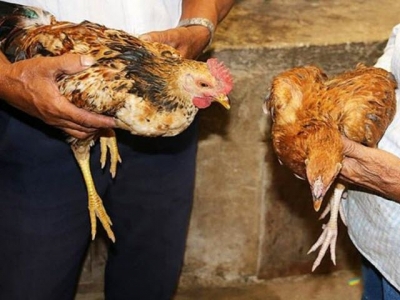Smartphone app to let farmers test for poultry infection

System will help farmers act fast before disease can spread and potentially infect people.
Photo: Brunel University London
Chicken farmers in the Philippines will soon test their birds for deadly pathogens with a new hand-held device and smartphone app they can use on their own farms, according to an announcement from Brunel University London in the U.K.
The system will help farmers act fast before disease can spread and potentially infect people, the announcement said, and it also cuts out the need to send samples away for expensive lab tests.
A team of scientists led by Brunel University London will develop a molecular test and a smartphone app that, when used together, detect six key pathogens in poultry.
Farmers will collect samples from their birds using a large, matchbox-sized instrument that screens DNA and RNA. The device connects wirelessly to the app to display the results, which can can also feed into a central database to help track outbreaks across the islands. The whole process takes less than an hour, the university said.
“Near-patient molecular diagnostics have been very important in improving human health," said Brunel University London professor Wamadeva Balachandran. “Such technology in animal health in farms is less advanced.
“This will make a massive change to the poultry industry, especially for low and middle-income countries,” Baalachandran said.
Hundreds of thousands of people in the Philippines and other poorer countries make a living farming poultry, so disease outbreaks can devastate their economies. However, standard molecular tests don’t work well for developing countries: Equipment is expensive, mobile instruments are rare and lab results can take hours or days, the university said.
Backed by £615,000 from the U.K. government’s Newton Fund, Balachandran will work with the University of Surrey and Lancaster University to develop the tests over the next three years.
“This quick and easy test will help vets identify disease among poultry, which helps prevent it spreading,” said professor Roberto La Ragione with the University of Surrey School of Veterinary Medicine. “The technology will not only benefit the Philippines, but could be rolled out to other developing countries.”
Reliable and affordable tests for viral diseases in poultry are one of the most important and challenges in poultry health in the developing world, said molecular virologist Dr. Muhammad Munir at Lancaster University.
“Many viruses and bacteria infect chickens simultaneously, especially in developing countries, and complicate the clinical signs of individual disease,” he said. “This makes molecular diagnostic tests that can be applied in less-equipped laboratories and on the farm a necessity.”
Có thể bạn quan tâm
 Poultry performance improves over past decades
Poultry performance improves over past decades Advances in modern layer performance mean gains of almost three extra eggs per bird annually. Poultry performance improves over past decades
 Everything You Need to Know About Duck Eggs
Everything You Need to Know About Duck Eggs The three major poultry products in the United States chicken, chicken eggs, and turkey so thoroughly dominate the economic landscape that the USDA
 Using maize gluten as an alternative protein source for poultry, pig feeds
Using maize gluten as an alternative protein source for poultry, pig feeds Maize gluten protein can replace part of soybean meal in diets, but like all ingredients, it has its positive and negative aspects that require attention during